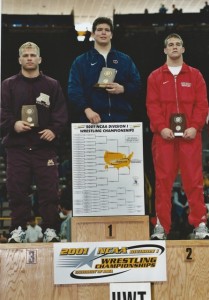
Treating an athlete with a sports inquiry can present a unique challenge to a sports medicine doctor. How do you get a young athlete back into the game as soon as possible, but as safely as possible? It’s a question that can be a difficult one to bridge with an athlete eager to get back to play, especially if it means missing time on the field or court. Parents, coaches, and teammates are all counting on them! But that’s what gives Seattle Children’s Hospital’s Drs. Monique Burton, John Lockhart and Celeste Quitiquit an edge. They’ve all been there.
As former Division I athletes, the trio knows what it’s like to suffer an injury, to push through pain, to the feel pressure of coaches or peers and the feeling of isolation that can come with an injury.
“We not only have the medical training to treat young athletes as pediatricians and sports medicine specialists, but as former Division I athletes who have dealt with our own injuries, we have a perspective that many people might not have,” said Lockhart, who was a wrestler at the University of Illinois. “Name almost any injury, or the vast majority of what we see, and I bet I’ve been through it – concussions, back pain, broken bones, knee problems, torn ligaments. I understand what it feels like when I’m helping one of my patients make a challenging decision, like to have surgery or not. I’ve been in their position making the same decisions.”
Relating to athletes through experience
For Quitiquit, who played basketball at Gonzaga University, she understands what it’s like to face a debilitating injury. She tore both of her anterior cruciate ligaments (ACLs) in college, once in her freshman year and then again during the last game of her sophomore season.
“With a season ending injury, I felt like part of my identity had been taken away from me and I felt isolated at times,” said Quitiquit. “My experience helps me provide not only excellent medical care, but also mentorship to young athletes. When families hear that I was a former athlete, I can feel the tension drop. They can trust that we are a team working together to get their child back to the activities they love.”
Finding a passion for helping others through injury
As a competitive and collegiate gymnast at the University of Pennsylvania, Burton also experienced her fair share of injuries. But that’s also what sparked her interest in becoming a pediatric sports medicine doctor.
“My first experience with a sports medicine doctor was in high school when I injured my shoulder. I finally found someone that really understood my sport and helped me get back to gymnastics quickly,” said Burton. “This injury as well as others, including an elbow surgery in college that took me out of fully competing for a year, really helped solidify my desire to go into sports medicine. I wanted to use my experience as an athlete and knowledge as a physician to help athletes participate to their full potential in their sport. When I meet with patients my goal is to speak with them, not just about their injury, but about how we’re going work together to help get them back to their sport, even better and stronger than when they came into see me.”
Getting athletes back in the game

Lockhart, who competed nationally and internationally as a wrestler, knows all too well how an injury can affect an athlete both physically and emotionally. He was the defending national champion going into his senior year when a dislocated patella forced him to pull out of the conference championships just two weeks before the National Championships. He struggled to get well enough to compete again and attempt to defend his title. On his road to recovery he had to make some difficult decisions with his athletic trainers, like if a competition was worth risking an injury that could potentially cause him to have ongoing knee pain for the rest of his life, or possibly need an operation.
“When you’re a young athlete you think you’re invincible,” said Lockhart. “It’s hard to imagine the permanent consequences of the decisions you make. All you hear is ‘You can’t compete.’ There are certain things you can play with, without risking long term consequences, but there are others you can’t. Those decisions are ones that you can pay for the rest of your life. I help my athletes by giving them the information they need to make a good decision. It’s reassuring to them to know that I’ve been there too, and understand what they are going through.”
Resources:
- Orthopedics and Sports Medicine
- Minimizing the risks from concussions – KING 5
- Boot Camp’ Designed to Prevent ACL Injuries Keeps Derby Girls Rolling
- Prevent Sports Injuries in Children and Teens

